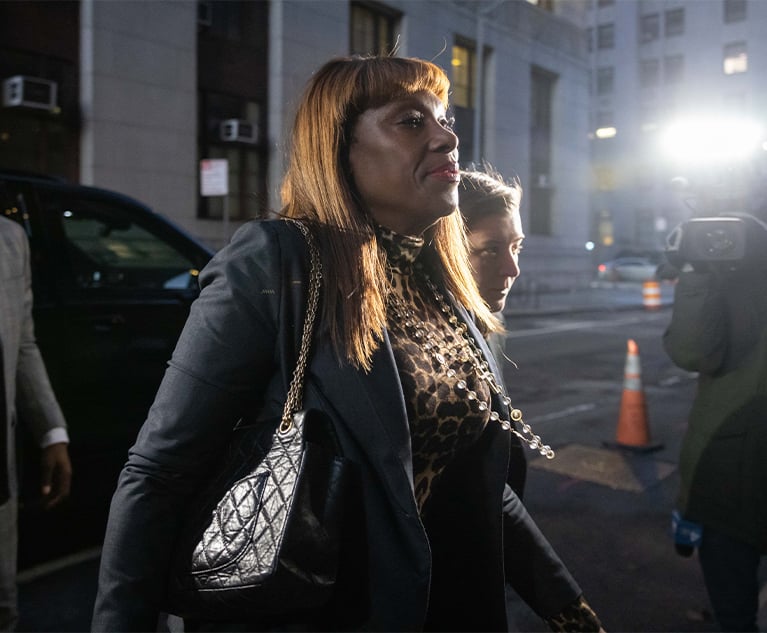 (Photo: NadyaEugene/Shutterstock.com)
(Photo: NadyaEugene/Shutterstock.com)Study Finds Advantages in Multidisciplinary Representation of Parents in Child Welfare Cases
The study, which examined more than 28,000 New York City child welfare cases, found that “full implementation of a multi-disciplinary representation model” would create some $40 million in annual savings for the foster care system, according to Bronx Defenders news release about the study.
May 10, 2019 at 03:00 PM
3 minute read
A newly released study says that multidisciplinary representation of parents in child welfare cases has multiple benefits when compared to traditional legal representation, including achieving family reunification more often in the early years and shortening children's stays in foster care, according to a Bronx Defenders news release about the study.
The study, which examined more than 28,000 New York City child welfare cases, also found that “full implementation of a multidisciplinary representation model” would create some $40 million in annual savings for the foster care system, added the Bronx Defenders, which says it runs a multidisciplinary family defense office with teams of lawyers, social workers and parent advocates.
The study was conducted by New York University School of Law and is titled, “Effects of an interdisciplinary approach to parental representation in child welfare.”
Posted as a PDF on a ScienceDirect website, the study has multiple researchers and authors, from several universities and a research organization, and the study notes that it was supported by a “generous grant” from Casey Family Programs to New York University School of Law.
Its introduction notes that “many national child welfare and legal experts believe that effective representation for parents in child welfare cases serves the vital purpose of engaging parents, supporting the safety and well-being of children and families, reducing the need for foster care, and saving government dollars.”
According to the news release from the Bronx Defenders, the study is a “first of its kind,” and it examined city child welfare cases during the period of 2007 to 2014.
More specifically, the news release said that the study looked at parents assigned solo practitioner lawyers on an “Assigned Counsel Panel” versus lawyers who worked for one of three multidisciplinary city family defense offices: the Bronx Defenders, Brooklyn Defender Services and the Center for Family Representation.
And it found that interdisciplinary family defense offices achieved the safe return of children to their families approximately 43% more often in the first year versus solo practitioners, the Bronx Defenders said.
In the second year, it was 25 percent more often, the news release added.
A “Highlights” page at the end of the study's PDF “Accepted Manuscript” report, which runs nearly 50 pages, says that:
- Interdisciplinary lawyers for parents hasten permanency for children in foster care;
- Interdisciplinary parental representation does not impact child maltreatment;
- Interdisciplinary parental representation may save millions of government dollars;
- Children who entered foster care spent 118 fewer days on average in foster care; and
- Children achieved overall permanency, reunification and guardianship more quickly.
Contacts listed on the Bronx Defenders' news release included representatives from Brooklyn Defender Services, the Center for Family Representation, The Bronx Defenders and Neighborhood Defender Services.
“The foster care system is not a substitute for loving families,” said Lauren Shapiro, director of Brooklyn Defender Services' Family Defense Practice, in the news release.
“Interdisciplinary parent representation keeps families together and children out of foster care. There is a significant benefit when attorneys work collaboratively, have supervision and extensive training, and access to supports they need to provide zealous legal representation to their clients,” she added.
This content has been archived. It is available through our partners, LexisNexis® and Bloomberg Law.
To view this content, please continue to their sites.
Not a Lexis Subscriber?
Subscribe Now
Not a Bloomberg Law Subscriber?
Subscribe Now
NOT FOR REPRINT
© 2024 ALM Global, LLC, All Rights Reserved. Request academic re-use from www.copyright.com. All other uses, submit a request to [email protected]. For more information visit Asset & Logo Licensing.
You Might Like
View All
Attorneys 'On the Move': Structured Finance Attorney Joins Hunton Andrews Kurth; Foley Adds IP Partner
4 minute read

NY Civil Liberties Legal Director Stepping Down After Lengthy Tenure

Former Top Aide to NYC Mayor Is Charged With Bribery Conspiracy
Trending Stories
- 1Call for Nominations: Elite Trial Lawyers 2025
- 2Senate Judiciary Dems Release Report on Supreme Court Ethics
- 3Senate Confirms Last 2 of Biden's California Judicial Nominees
- 4Morrison & Foerster Doles Out Year-End and Special Bonuses, Raises Base Compensation for Associates
- 5Tom Girardi to Surrender to Federal Authorities on Jan. 7
Who Got The Work
Michael G. Bongiorno, Andrew Scott Dulberg and Elizabeth E. Driscoll from Wilmer Cutler Pickering Hale and Dorr have stepped in to represent Symbotic Inc., an A.I.-enabled technology platform that focuses on increasing supply chain efficiency, and other defendants in a pending shareholder derivative lawsuit. The case, filed Oct. 2 in Massachusetts District Court by the Brown Law Firm on behalf of Stephen Austen, accuses certain officers and directors of misleading investors in regard to Symbotic's potential for margin growth by failing to disclose that the company was not equipped to timely deploy its systems or manage expenses through project delays. The case, assigned to U.S. District Judge Nathaniel M. Gorton, is 1:24-cv-12522, Austen v. Cohen et al.
Who Got The Work
Edmund Polubinski and Marie Killmond of Davis Polk & Wardwell have entered appearances for data platform software development company MongoDB and other defendants in a pending shareholder derivative lawsuit. The action, filed Oct. 7 in New York Southern District Court by the Brown Law Firm, accuses the company's directors and/or officers of falsely expressing confidence in the company’s restructuring of its sales incentive plan and downplaying the severity of decreases in its upfront commitments. The case is 1:24-cv-07594, Roy v. Ittycheria et al.
Who Got The Work
Amy O. Bruchs and Kurt F. Ellison of Michael Best & Friedrich have entered appearances for Epic Systems Corp. in a pending employment discrimination lawsuit. The suit was filed Sept. 7 in Wisconsin Western District Court by Levine Eisberner LLC and Siri & Glimstad on behalf of a project manager who claims that he was wrongfully terminated after applying for a religious exemption to the defendant's COVID-19 vaccine mandate. The case, assigned to U.S. Magistrate Judge Anita Marie Boor, is 3:24-cv-00630, Secker, Nathan v. Epic Systems Corporation.
Who Got The Work
David X. Sullivan, Thomas J. Finn and Gregory A. Hall from McCarter & English have entered appearances for Sunrun Installation Services in a pending civil rights lawsuit. The complaint was filed Sept. 4 in Connecticut District Court by attorney Robert M. Berke on behalf of former employee George Edward Steins, who was arrested and charged with employing an unregistered home improvement salesperson. The complaint alleges that had Sunrun informed the Connecticut Department of Consumer Protection that the plaintiff's employment had ended in 2017 and that he no longer held Sunrun's home improvement contractor license, he would not have been hit with charges, which were dismissed in May 2024. The case, assigned to U.S. District Judge Jeffrey A. Meyer, is 3:24-cv-01423, Steins v. Sunrun, Inc. et al.
Who Got The Work
Greenberg Traurig shareholder Joshua L. Raskin has entered an appearance for boohoo.com UK Ltd. in a pending patent infringement lawsuit. The suit, filed Sept. 3 in Texas Eastern District Court by Rozier Hardt McDonough on behalf of Alto Dynamics, asserts five patents related to an online shopping platform. The case, assigned to U.S. District Judge Rodney Gilstrap, is 2:24-cv-00719, Alto Dynamics, LLC v. boohoo.com UK Limited.
Featured Firms
Law Offices of Gary Martin Hays & Associates, P.C.
(470) 294-1674
Law Offices of Mark E. Salomone
(857) 444-6468
Smith & Hassler
(713) 739-1250






